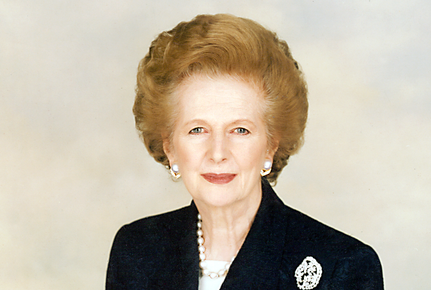Margaret Thatcher, 87, Controversial, Barrier-Breaking First Female Prime Minister of the United Kingdom

Margaret Thatcher, the controversial Conservative Party leader in the U.K. whose hard-hitting right-wing policies and unwavering devotion to her ideals earned her the nickname Iron Lady, succumbed to a stroke on Monday after years of battling ill health and memory problems. She was 87. Her death was announced by a family spokesman.
Thatcher’s contentious policies on immigration, welfare and unions made her a figure of much derision in politics. Some hail her as a free-market capitalist and economic reformer who whipped the trade unions into line, but most of her critics -- and there are many -- regard her as a moral absolutist with no stomach for compromise and no empathy for the people who were left unemployed, unable to immigrate to Britain, or destitute because of her policies. Even her gender was ultimately held against her: Despite becoming the first female leader of a major Western power, many British feminists regard her with contempt and say she did little to advance the cause of women’s rights during her term.
Born on October 13, 1925, in Grantham, a small city north of London, Thatcher, née Roberts, was the younger daughter of Alfred and Beatrice Roberts. Her father was a grocer who served as a member of the town council and mayor of Grantham, sparking the young Margaret’s interest in politics.
Thatcher studied chemistry at Somerville College, Oxford, but remained immersed in the political scene. She served as president of the Oxford University Conservative Association in her third year and ran in her first election only two years after graduating from Oxford, at a time when women were a rarity in government if not outright excluded. Her first two bids for a seat in the U.K. Parliament, in 1950 and ’51, were unsuccessful, but after marrying Denis Thatcher in December 1951, passing the bar in 1953, and giving birth to her twins, Carol and Mark, she was elected to the House of Commons in 1959.
Thatcher rose quickly through the ranks of the Conservative Party: She was appointed undersecretary for pensions and national insurance in 1961, a foreshadowing of the stringent policies to come during her premiership. She became a member of the Shadow Cabinet while the rival Labour Party was in power, and she was named secretary of state for education and science in 1970. During her tenure she terminated a program that provided free milk to school aged children, for which she was dubbed “Thatcher, milk snatcher.”
Despite the opposition she faced, she beat out Conservative Party leader and sitting Prime Minister Edward Heath in the 1975 elections, becoming the first female opposition leader, and then in May 1979, the first female prime minister of Britain.
Thatcher inherited a country in a deep recession, politically and economically unstable, with an almost-bankrupt government and rising inflation and unemployment. She chose to battle this threat by attacking the seemingly indomitable trade unions and by privatizing institutions that were traditionally state-run, such as housing projects and public transit. Her policies reduced inflation and interest rates but pushed up unemployment to between 3.6 and 5 million, stunting Britain’s manufacturing output.
One of the flash points of Thatcher’s first term was her decision to take Britain to war with Argentina over the Falkland Islands, a small archipelago to the southeast of the South American country, which had long been the center of dispute between the two nations. The U.K. had administered the islands since 1833, but Argentina, which was itself suffering from economic instability at the time, invaded the islands in April 1982. In response, Thatcher sent the full force of the British navy to take them back for Britain. After two months of the most violent war the islands had ever seen, with about 650 Argentinians and more than 250 Britons killed, Argentina surrendered. Thatcher’s approval rating soared in response, securing her place at 10 Downing Street, the British premier’s official residence, for a second term in the 1983 elections.
Thatcher’s second term was marked by the 1984-’85 strike by miners who were protesting the closing of several mines deemed unprofitable by investors. After a year of infighting within the unions, the leadership finally conceded, giving Thatcher another victory and a reputation as a strike-buster.
Throughout her terms, Thatcher was close with then-U.S. President Ronald Reagan, often described as her “political soul mate.” The two shared a similar economic philosophy, dubbed “Thatcherism” in the U.K. and “Reaganomics” in the U.S., revolving around deregulation and privatization of industries.
After attempting to implement a controversial poll tax that left her party in tatters, Thatcher resigned from the Conservative Party in November 1990. She was given the title Baroness of Kesteven in 1992 and joined the House of Lords. She published several books before suffering a series of strokes and the death of her husband in the late '90s and early '00s.
Despite her detractors and seemingly cold demeanor, Thatcher is considered one of the most important political figures of the 20th century. She is often credited with revitalizing Britain’s economy and laying the groundwork for Britain’s foreign policy for years to come.
© Copyright IBTimes 2024. All rights reserved.





















